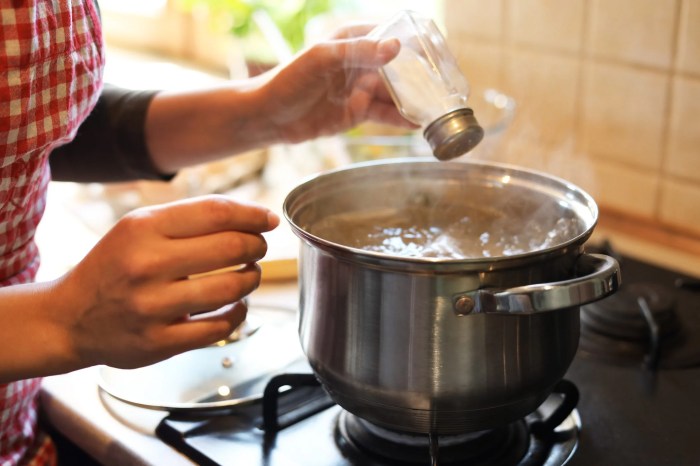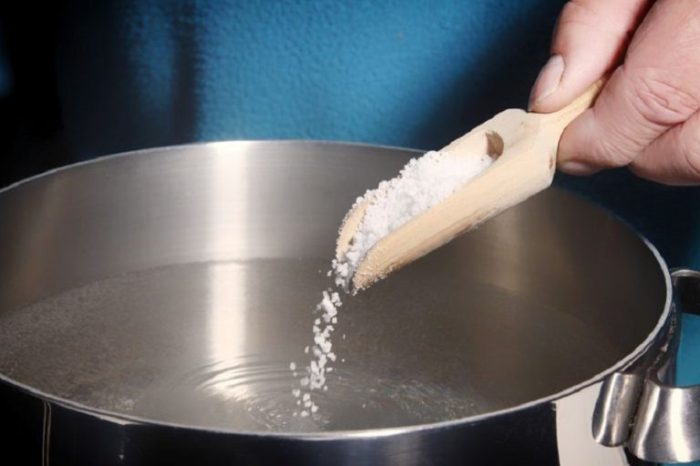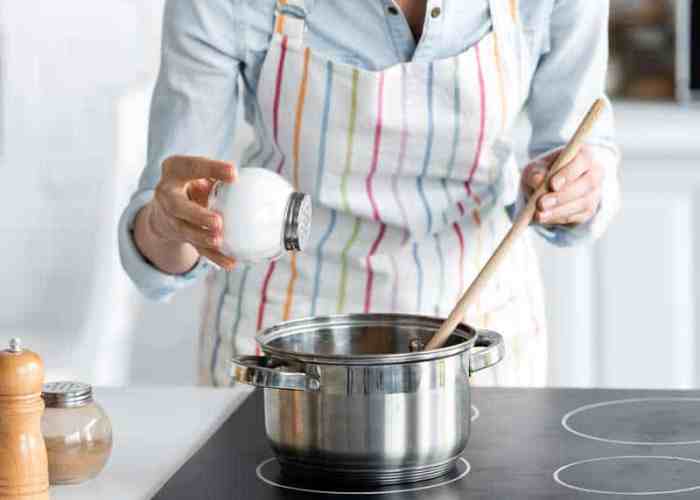Pip believes adding ________ will help the water boil faster. – In the culinary realm, Pip, a seasoned chef, holds a steadfast belief that adding salt to water accelerates its boiling process. This notion, commonly held by many home cooks, begs the question: does adding substances like salt truly influence the boiling point of water? Delving into the scientific underpinnings of boiling point elevation, this article explores Pip’s hypothesis, examining the effects of various substances on water’s boiling point and uncovering the practical applications of this phenomenon in diverse fields.
Boiling point elevation, a colligative property, describes the increase in a liquid’s boiling point when a non-volatile solute is dissolved in it. This phenomenon arises from the solute particles competing with water molecules for space at the liquid-vapor interface, effectively hindering water molecules from escaping into the vapor phase.
Consequently, a higher temperature is required for the liquid to reach its boiling point.
Boiling Point Elevation: The Impact of Added Substances: Pip Believes Adding ________ Will Help The Water Boil Faster.

The boiling point of a liquid is the temperature at which its vapor pressure equals the pressure surrounding the liquid and the liquid changes into a vapor. The addition of certain substances to water can alter its boiling point, a phenomenon known as boiling point elevation.
Colligative Properties and Boiling Point Elevation
Boiling point elevation is a colligative property, which means that it depends on the concentration of the dissolved substance rather than its chemical nature. The more concentrated the solution, the higher its boiling point. This is because the dissolved particles interfere with the intermolecular forces between water molecules, making it harder for them to escape into the vapor phase.
Effects of Various Substances on Boiling Point
| Substance | Boiling Point (°C) |
|---|---|
| Water | 100 |
| 1 M NaCl | 100.5 |
| 1 M Sucrose | 100.5 |
| 1 M Ethanol | 78.3 |
As the table shows, the addition of salt or sugar raises the boiling point of water, while the addition of alcohol lowers it. This is because salt and sugar are non-volatile solutes, meaning they do not evaporate easily, while alcohol is a volatile solute, meaning it evaporates easily.
Experiment to Test Hypothesis, Pip believes adding ________ will help the water boil faster.
Procedure:
- Fill a beaker with water and measure its initial temperature.
- Add a known mass of salt to the water and stir until dissolved.
- Heat the water until it boils and record the boiling point.
- Repeat steps 2-3 for different concentrations of salt.
Variables:
- Independent variable: concentration of salt
- Dependent variable: boiling point
- Controlled variables: volume of water, heating rate, atmospheric pressure
Flowchart of Boiling Water with Added Substances
- Initial conditions:Water at room temperature, atmospheric pressure
- Changes during boiling:Water molecules gain energy, break free from intermolecular forces, and transition to vapor phase
- Effects of added substances:Non-volatile solutes (e.g., salt, sugar) increase boiling point; volatile solutes (e.g., alcohol) decrease boiling point
- Final result:Water boils at an elevated temperature (for non-volatile solutes) or a lowered temperature (for volatile solutes)
Practical Applications
Boiling point elevation has numerous practical applications, including:
- Cooking:Adding salt to water raises its boiling point, allowing food to cook faster.
- Chemistry:Boiling point elevation is used to determine the molar mass of unknown substances.
- Engineering:Boiling point elevation is used to design cooling systems that operate at higher temperatures.
Query Resolution
Does adding sugar to water also raise its boiling point?
Yes, adding sugar to water raises its boiling point, albeit to a lesser extent compared to salt. This is because sugar molecules, like salt ions, compete with water molecules at the liquid-vapor interface, hindering their escape and elevating the boiling point.
Why does adding salt to water make it boil faster?
Adding salt to water does not make it boil faster. In fact, it raises the boiling point, meaning a higher temperature is required for the water to reach its boiling point. The misconception arises from the fact that salt water boils with more vigorous bubbling due to the presence of salt crystals, which act as nucleation sites for water vapor bubbles.

